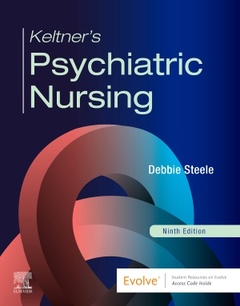Description
Keltner's Psychiatric Nursing (9th Ed.)
Author: Steele Debbie
Language: English
Subject for Keltner's Psychiatric Nursing:
552 p. · 21.5x27.6 cm · Paperback
Description
/li>Contents
/li>
Gain the skills you need to provide safe and effective psychiatric nursing care! Keltner's Psychiatric Nursing, 9th Edition provides a solid foundation in the knowledge required to manage and care for patients with psychiatric disorders. It features a unique, three-pronged approach to psychotherapeutic management emphasizing the nurse's three primary tools: themselves and their relationship with patients, medications, and the therapeutic environment. New to this edition are Next Generation NCLEX® exam-style case studies to help you learn clinical judgment and prepare for success on the NCLEX. Known for its clear and friendly writing style, this text covers psychiatric nursing like no other book on the market.
- UNIQUE! Practical, three-pronged approach to psychotherapeutic management includes: 1) the therapeutic nurse-patient relationship, 2) psychopharmacology, and 3) milieu management.
- UNIQUE! Norm's Notes offer personal, helpful tips from Norman Keltner - an expert educator and the book's erstwhile author - in each chapter.
- UNIQUE! Putting It All Together summaries are provided at the end of each psychopathology chapter.
- DSM-5 information is integrated throughout the text, along with new ICNP content.
- Nursing care plans highlight the nurse's role in psychiatric care, emphasizing assessment, planning, nursing diagnoses, implementation, and evaluation for specific disorders.
- Case studies depict psychiatric disorders and show the development of effective nursing care strategies.
- Critical thinking questions help you develop clinical reasoning skills.
- Family Issues boxes highlight the issues that families must confront when a member suffers from mental illness.
- Patient and Family Education boxes highlight information that the nurse should provide to patients and families.
- Learning resources on the Evolve website include lecture slides, psychotropic drug monographs, and NCLEX® exam-style review questions.
- NEW! Next Generation NCLEX ® (NGN) examination-style case studies and NGN item types are included for five of the major mental health disorders, allowing you to apply clinical judgment skills.
- NEW! Updated Clinical Examples discuss real-world situations relating to mental health.
- NEW! COVID-19 resources and research includes information relevant to psychiatric nursing care.
- NEW!International Classification for Nursing Practice (ICNP) nursing diagnoses, from the International Council of Nurses, include straightforward, evidence-based terminology that is easily translatable across settings and disciplines.
UNIT I The Basics 1 Me, Meds, Milieu 2 Historical Issues 3 Legal Issues 4 Psychobiologic Bases of Behavior 5 Cultural Issues 6 Spirituality Issues UNIT II You (Therapeutic Nurse-Patient Relationship) 7 Models for Working With Psychiatric Patients 8 Learning to Communicate Professionally 9 Working With an Individual Patient 10 Working With Groups of Patients 11 Working With the Family UNIT III Medication (Psychopharmacology) 12 Introduction to Psychotropic Drugs 13 Antiparkinsonian Drugs 14 Antipsychotic Drugs 15 Antidepressant Drugs 16 Antimanic Drugs 17 Antianxiety Drugs 18 Antidementia Drugs 19 Alternative Preparations and Over-the-Counter Drugs UNIT IV Environment: Milieu Management 20 Introduction to Milieu Management 21 Variables Affecting the Therapeutic Environment: Violence and Suicide 22 Therapeutic Environment in Various Treatment Settings UNIT V Putting It All Together(Psychopathology) 23 Introduction to Psychopathology 24 Schizophrenia Spectrum and Other Psychotic Disorders 25 Depressive Disorders 26 Bipolar Disorders 27 Anxiety-Related, Obsessive-Compulsive, Traumaand Stressor-Related, Somatic, and Dissociative Disorders 28 Neurocognitive Disorders 29 Personality Disorders 30 Sexual Disorders and Gender Dysphoria 31 Substance Use Disorders 32 Eating Disorders UNIT VI Special Populations 33 Survivors of Violence and Trauma 34 Children and Adolescents 35 Older Adults 36 Soldiers and Veterans GlossaryIndex




